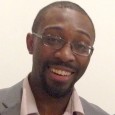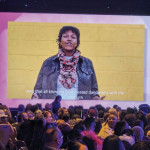So the question becomes who is sitting at your table? We are in a unique moment that asks something more of us. It is an unprecedented time but also affords us new opportunities. But to the maximum this influxion moment we have to do some hard work on the ground to make sure we are rebuilding a movement that can respond to the unique pressures of this moment. And so I ask who is missing from your table because that is the question of coalition politics in their uncertain moments? I heard the words of a Melissa Harris-Perry in her speech at USCA in 2016. She offered insights that that helped me focus on this issue and I think it’s worth a revisit of the critical parts of the conversations that we can draw wisdom from as we think about this moment of the coalition and collective work. Harris-Perry said:
“Expand your definition of Blackness to all those bodies with a uterus, all those bodies that present with one gender but want to use a different body. All those bodies that need access - problems. Queer bodies - problems. Undocumented bodies - problems. Black Lives Matter if we expand Blackness to a Du Boisian understanding that begins to encompass a broader understanding of health. When we think of Black Lives, what matters, we see a social movement that includes a question and definition of a much larger set of structures. Race and health are linked.”
In the vain of the expanded view of Harris-Perry, I ask you at this moment who is at your table? You see it is not just a question of who did you seat it but who can still be seated at your table. Many paths led to the well of justice, and it’s our job to mark the most effective ways to highlight the pitfalls we might cross. But without a greater engagement of we miss those that took another road. And we might miss mapping a course that can help lead us to an end of the HIV epidemic.
I think about the strength of diversity in the HIV research community. That by bringing more people
Allies or dinner guest exist in a variety of places such the criminal justice reformers, the housing specialists, the disability rights groups, and the community planners. But also in areas, you might not think to look for guests. Like the environmentalist, not an intrinsically that we first look too, however, there is a strong link between overall health including immune health and the wellbeing of the environment. Environmental factors can play a role in the body’s abilities to defend itself. Over the course of the prevention and care continuum for anything that can help improve your overall health, will help with the fight against HIV. Moreover, we can think about how we envision our community and those community planners. The ability to have health center options nearby and other essential services can help in the long term. Building alliances and boarding your table makes you better positions to take advantage of strategic opportunities as the landscape shifts. Thinking about our place in these broad coalitions and movements are a crucial factor in thinking about our table. The other people that can gain sustenance and be fed by the table you provide. It’s a question of imagining a broader reality and will. And when it comes to imagination, I think about the power of a child.
Really I think about a child of the 80s and 90s; I think we can draw a good lesson from a pivotal movie of that era, Hook. Perhaps not pivotal but there is an element of revolution in the film. Its depiction leaves the viewer with a lesson about the notion of community and table. You can see in Hook the lost boys would sit down at an empty table. Then through sheer force of will and imagination, they created a feast fit for a celebration of a remarkable lively existence. And perhaps that metaphorical lesson is something we can all take away. That our ability to understand, set an intention and release unbridled joy with purpose, can allow us to restructure our reality.
As you go into 2018 think about your table and what world is it built through the gathering, imagining and construction. Think about your table’s ability to create, and to shape, way forward in changing our world. That a bigger table takes more work to build, but it is worth the effort. Remember that your table can be a place where individuals access true nourishment and leave both fed and satisfied. With that, we can change this place. I leave you with one last thought from Melissa Harris-Perry.
“Here is the good news. The struggle continues. Nobody promised you would get to live during the part of the revolution we when we were winning. Maybe you’ll get to see wins you never even imagined… Nobody promised you get to be there during the winning part. You ARE promised that people worked hard before you. Your responsibility is that during your part you take the baton. You do not have to do it alone.”








Comments
Comments